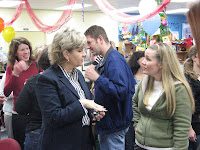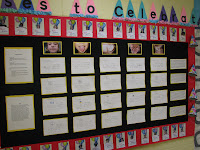
As teachers from Chets Creek have become engossed in the ideas of how blogging can open the world to them, they have branched off into something new - a new type blog, LIVE from the Creek that will archive their travel to conferences. This blog is the brainchild of  Melanie Holtsman, Teacher of the Gifted and Intermediate Literacy Coach who wants to make our professional development real time. Our first undertaking will be a trip to Hollywood, CA for the NCEE (National Center for Education and the Economy) America's Choice national conference January 29-February 2, 2008. Chets Creek is a National Model School for the America's Choice School Design. Ten teachers/ coaches/ adminstrators from the Leadership Team will be presenting at the conference. Not only will we be blogging our own presentations LIVE, but we will blog everything that we see and do. That way, our teachers at home will also be able to learn as we go. We also hope that teachers, coaches and administrators from around the world will join us by listening in, by questioning and by commenting. We can hardly wait! As soon you get a chance, join us!
Melanie Holtsman, Teacher of the Gifted and Intermediate Literacy Coach who wants to make our professional development real time. Our first undertaking will be a trip to Hollywood, CA for the NCEE (National Center for Education and the Economy) America's Choice national conference January 29-February 2, 2008. Chets Creek is a National Model School for the America's Choice School Design. Ten teachers/ coaches/ adminstrators from the Leadership Team will be presenting at the conference. Not only will we be blogging our own presentations LIVE, but we will blog everything that we see and do. That way, our teachers at home will also be able to learn as we go. We also hope that teachers, coaches and administrators from around the world will join us by listening in, by questioning and by commenting. We can hardly wait! As soon you get a chance, join us!
 Melanie Holtsman, Teacher of the Gifted and Intermediate Literacy Coach who wants to make our professional development real time. Our first undertaking will be a trip to Hollywood, CA for the NCEE (National Center for Education and the Economy) America's Choice national conference January 29-February 2, 2008. Chets Creek is a National Model School for the America's Choice School Design. Ten teachers/ coaches/ adminstrators from the Leadership Team will be presenting at the conference. Not only will we be blogging our own presentations LIVE, but we will blog everything that we see and do. That way, our teachers at home will also be able to learn as we go. We also hope that teachers, coaches and administrators from around the world will join us by listening in, by questioning and by commenting. We can hardly wait! As soon you get a chance, join us!
Melanie Holtsman, Teacher of the Gifted and Intermediate Literacy Coach who wants to make our professional development real time. Our first undertaking will be a trip to Hollywood, CA for the NCEE (National Center for Education and the Economy) America's Choice national conference January 29-February 2, 2008. Chets Creek is a National Model School for the America's Choice School Design. Ten teachers/ coaches/ adminstrators from the Leadership Team will be presenting at the conference. Not only will we be blogging our own presentations LIVE, but we will blog everything that we see and do. That way, our teachers at home will also be able to learn as we go. We also hope that teachers, coaches and administrators from around the world will join us by listening in, by questioning and by commenting. We can hardly wait! As soon you get a chance, join us! 





















 Mrs. Lewis
Mrs. Lewis Mrs. Harbour's
Mrs. Harbour's

 Mrs. Mallon's
Mrs. Mallon's 











 Today all Science teachers at Chets Creek enjoyed grade specific workshops by
Today all Science teachers at Chets Creek enjoyed grade specific workshops by 


